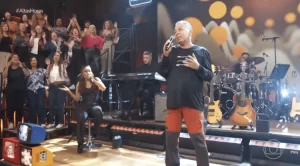I was born two decades too late. Back in 1975, shit was cool. You could be a cheesy, no-shirt-wearin’ guitar dude with a lisp and somehow still get the ladies. Or so you’d think while listening to the Brazilian singer Hyldon. His first solo album, Na Rua, Na Chuva, Na Fazenda (“In the street, the rain, the farm”) is full of sultry grooves, paired with lyrics that are charmingly lame if you speak Portuguese and beautiful if you don’t. (Contrast with Wyclef Jean, who tries the I’m-singing-in-another-language trick all the time to impress American audiences… but just sounds lame throughout.)
The joy of this album is its warmth. Slow jams like the title track evoke a calm, humid midsummer evening where you might be doing any number of things, but they probably all involve having sex. (Apparently the producers of “City of God” agree, as this song was used during a love scene in the film.) Other songs, like “Vamos Passear De Bicicleta?” start lethargically but build to the type of groove that make you wonder how such a slow song could make you want to dance (think D’Angelo at his finest). Of course, there are a few blunders on the album: “Quando a Noite Vem” is a weak digression into disco, and “Vida Engraçada” is only saved by its wonderfully understated horn arrangement. Slow songs proliferate, but at the cusp of drowsiness all is forgiven when the up-tempo and winning “Meu Patuá” arrives to close the album. Rewind!
This album also sounds great from a technical perspective. Unlike modern recordings where loudness is king and the music pushes you back from the speaker cones, this album invites you in and embeds you in a spacious sonic landscape. Hi-hats and shakers shimmer on the fringes, bass and drums solidly drive the rhythm but never overpower the vocals or the occasional arrival of strings or the backup choir. (I wish every producer displayed the same restraint with the string section.) Hyldon’s voice, cracking and lispy, is a wonderful counterbalance to the almost too-sweet instrumentation backing him up. Though many albums from the ’70s share the warm analog sound of “Na Rua,” this is one of the most luscious of the genre. (Just for the record, I’m writing this review by candlelight; it’s the right thing to do when Hyldon’s involved.) This is an album to turn to whenever you need a languid summer day… or night.





